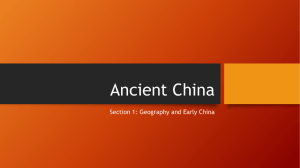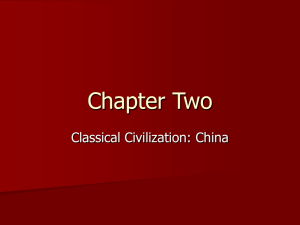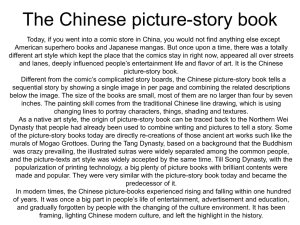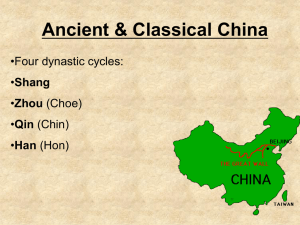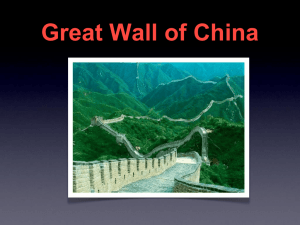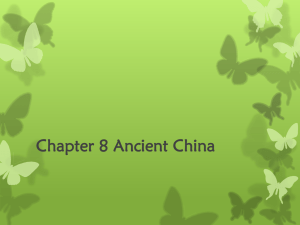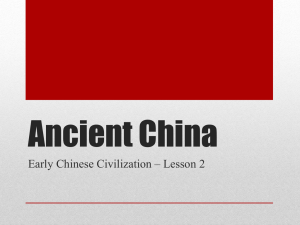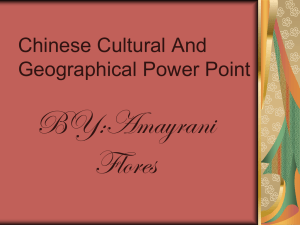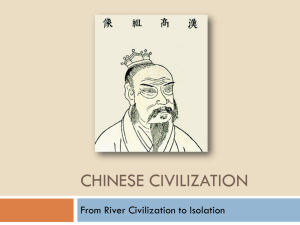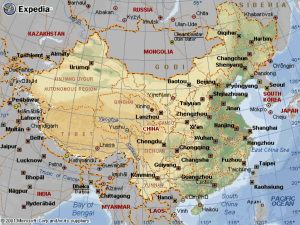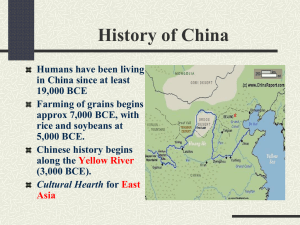New Dynasty - Holmdel Township Public Schools
advertisement
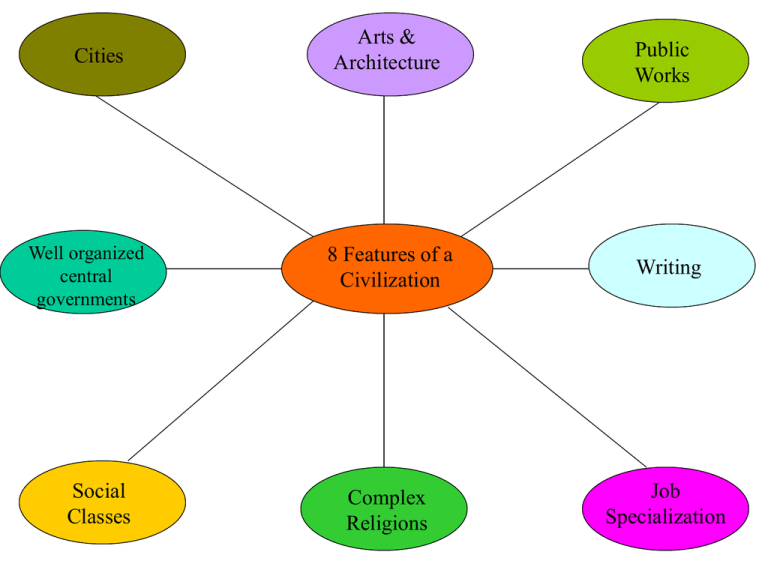
Cities Well organized central governments Social Classes Arts & Architecture Public Works 8 Features of a Civilization Writing Complex Religions Job Specialization Chap. 3 Sec. 3 Middle Kingdom Chinese called their land Zhongguo _______ meaning _______________. It was Isolated of the early civilizations which led them to believe that the most ______ China Earth and the only source of civilization. ____ was the center of the _____ Geography set barriers which limited the movement of people. Jungles , _______and Deserts Oceans divided China from the rest of _______ ________ Trade and attacks by the world. The contact they did have was some _____ Invaders These groups accepted the __________ Superiority of the Chinese nomadic______. absorbed into the advanced Chinese civilization. and were usually ________ Main regions of China: Heartland east coast; valley of the _________ Huang He and Yangzi _________: Farming Rivers; excellent for_______. Outlying Xinjiang, _________ Mongolia and Manchuria; rugged _________; harsh climate; nomads and ____ _____ live here. Huang He Valley. People teamed to Chinese history began in the ________ Farm and this led to the beginning of a strong ______ central government. The _____ Loess name of the river came from _____(fine yellow soil) that it carried. It got the River of Sorrows because __________ flooding nickname "____________" caused destruction. dynasties They Control of China was by ruling families called ________. government remained in power as long as they provided good ___________. If rulers heaven would withdraw its support. became weak or corrupt they believed ______ Chinese Achievement SHANG DYNASTY (1500 B.C.-1028 B.C.) 200 city-states in China. United more than ____ Used war Chariots ______ and advanced weapons _____ to protect their territories and spread Chinese kingdom. Captured new _______ civilization. People began to keep ______ written records for the first time. Over 10,000 ____ characters made it hard to read and write. calendar was invented based on phases of the ____ moon A _____ 365¼ days a year. and_____ ZHOU DYNASTY ( 1028 B.C.-256 B.C.) Control by this dynasty was the ______ longest in Chinese history. coins used for the first time. Local _____ Princes Copper and gold _____ owned the land but owed _____ military service and other support to King populated country the _____. China became the world's most ______ during these years. Ruled by the “____________” Mandate of Heaven the divine Gods right to rule through orders from the ______. QIN DYNASTY (256 B.C.-206 B.C.) China derived from the Qin or Ch'in Dynasty. Name _____ First Emperor Shih Huang Ti-"__________" captured new territories and set empire up the first Chinese ______. Great Wall Completed work on the ___________ which guarded against invasion. System of _______ writing was simplified and a uniform set of weights _____ adopted. HAN DYNASTY (206 B.C.- 220 A.D.) Empire expanded into Manchuria, ______ Mongolia and central Asia. silk wheel & clock Invented______, sundials and water __________. acupuncture a piercing of the Doctors used a new method-__________ skin with needles to relieve pain. dictionary Wrote the world's first ________. New Dynasty Old Dynasty •Brings peace •Taxes people too much •Builds roads & canals •Stops protecting people •Gives land to peasants •Lets road & wall fall apart •Protects people •Treats people unfairly Problems New dynasty claims Mandate of Heaven •Floods, earthquakes •Peasants revolt •Invaders attack empire •Bandits raid in provinces Old dynasty loses Mandate of Heaven It is not a religion Based on the teachings of China’s most influential philosopher He was concerned with social order & good government The best leader could rule by good moral example He stressed the importance of duty, responsibility, & filial piety The Analects Harmony resulted from people accepting their place in society 5 Relationships – father to son, elder brother to younger, husband to wife, ruler to subject, friend to friend Grew out of the teachings of Hanfeizi Also concerned with social order The only way to achieve this order was through strict laws & punishments Strength not goodness is a ruler’s greatest virtue So cruel that later generations despised it Focus was on the Tao “The Way” (the universe as a whole) Concerned with living in harmony with nature – Simple Life The best type of government is one that governs the least Emphasized the virtue of yielding – going with your natural course Believers rejected the unnatural ways of society – became hermits, mystics, artist, or poets Evolved into a popular religion with gods, goddesses, & magical practices (alchemy). Laozi Became another popular school of thought Was hard to accept at first. No family loyalty, but loyalty to monks and nuns that gave up family life Introduced nirvana Was appealing because of the promise of escape from suffering. No personal salvation in other schools of thinking Buddhism absorbed Confucian & Taoist traditions in China •The first dynasty that we know about •According to legend, there was a Xia dynasty before them but archaeologists have not yet found any written records from this era. •Writing on bronze vessels and oracle bones have survived from Shang times. •States fought each other for land until the Shang kings gained control in northern China and set up large cities. •Peasants grew food for everyone and craftspeople made tools, weapons, clothing, ornaments and household goods from bronze, silk, jade, clay and other materials. •The royal family lived inside a walled palace with their advisers, and diviners who predicted the future. •When a king died, servants and animals were sacrificed to go with him to Heaven. •Warlike Zhou people from the Wei River Valley in the northwest conquered the Shang and began a dynasty that lasted for more than 800 years. •Zhou rulers enlarged the Shang kingdom and gave land to their relatives and advisers. At first, these noblemen were loyal to the Zhou kings. But during the time of the Warring States, the local lords raised armies •They forced many peasants to become foot soldiers, and competed with one another for power. •The Zhou era brought important changes. Cities grew in size and number, and merchants began to carry trade goods between them. Metalworkers forged iron tools and weapons. The use of iron plows made farming easier and increased food production. •Scholars reacted to the unsettled times by thinking of ways to make ancient China a more peaceful country. •The powerful Qin conquered the six major kingdoms that remained at the end of the Warring States period. •The king thanked his ancestors for his success and decided to drop the title wang, which meant "king." •He renamed himself Shi (meaning "First“) Huangdi (meaning "emperor and divine ruler"). •The First Emperor was very important because he unified ancient China by making strict laws, taxing everyone in the country and introducing one script for writing. •He commanded his subjects to build roads and canals, and to join existing walls into one long defensive wall. •Qin Shi Huangdi did not agree with the teachings of Confucius and other scholars, and ordered their books to be burned. •The First Emperor paid magicians, called alchemists, for potions to help him live forever. •After his death, his dynasty soon collapsed. •Liu Bang, a government official, gained power and founded this dynasty, which lasted for more than 400 years. •Han emperors strengthened the Qin system of government and extended ancient China's boundaries. •They developed a civil service, based on the teachings of Confucius, to run the empire and keep records in a central place. •Scholars who wanted to become government officials had to study very hard. •The government organized the salt and iron mines, and state factories began mass-producing objects-from iron and steel farming tools to silk cloth and paper. •Han emperors began to control the eastern end of the Silk Road that linked Asia and Europe. •Buddhism started to spread throughout ancient China. •The Han dynasty finally collapsed after a succession of weak child emperors and droughts and floods. scholars peasants Respected by everyone because they could read & write The country depended on them to produce food artisans Used their skills to make things that people needed (weapons, tools, & cooking utensils) merchants They made nothing, yet grew rich by trading goods.
